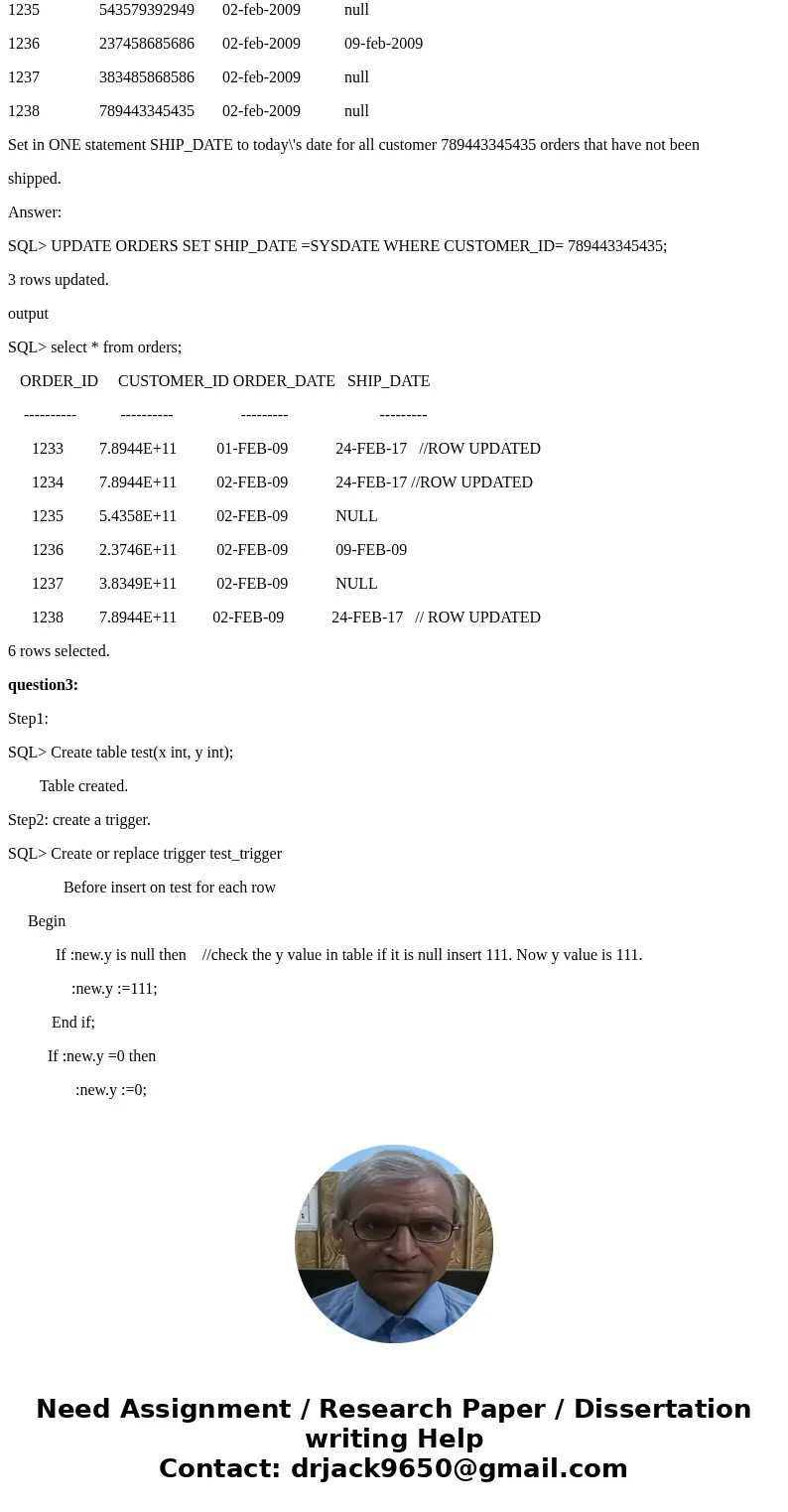1 Can a childs FK field have a different name than the paren
1. Can a child\'s FK field have a different name than the parent\'s PK field? Provide examples.
2.
Suppose you have a table ORDERS.
ORDER_ID CUSTOMER_ID ORDER_DATE SHIP_DATE
-----------------------------------------------------------------------------
1233 789443345435 01-feb-2009 10-feb-2009
1234 789443345435 02-feb-2009 null
1235 543579392949 02-feb-2009 null
1236 237458685686 02-feb-2009 09-feb-2009
1237 383485868586 02-feb-2009 null
1238 789443345435 02-feb-2009 null
Set in ONE statement SHIP_DATE to today\'s date for all customer 789443345435 orders that have not been shipped.
3.
Consider the following PL/SQL block. What will be the value of y in the inserted row?
4.
Create table Employee with empID (PK), empFname, empLname, emp-salary.
Insert at least 4 rows in the Employee table
Create a trigger that will fire automatically in response to any change in salary before delete or insert or update on employee table.
Check what happens when you try any of the events (insert-update-delete)
Create at least two test cases for each event.
What to submit:
Write SQL code to create Employee table.
Write SQL code to insert values in tables.
Write Trigger code
Submit Test cases and trigger execution results with screen shots.
CREATE TABLE test. (x INT, Y INT) create or replace TRIGGER test trigger BEFORE INSERT ON test FOR EACH ROW BEGIN IF new. Y IS NULL THEH new. Y 111; END IF: THEN new. Y mew. Y END IF: EHD: INSERT INTO test. (x) VALUES (10) SELECT FROM test.Solution
1. Can a child\'s FK field have a different name than the parent\'s PK field? Provide examples.
The foreign key field in child table has a different name or same name are allowed.
But the domain or data type must be same.
Parent table:STUDENT ,(SID IS PRIMARY KEY DATA TYPE INTEGER)
SID(pk)
SNAME
AGE
501
smith
20
502
john
22
503
peter
21
Child table: ENROLLED Student_id IS FORIGN KEY
Student_id(fk)
--------------
Course_id
grade
503
CS02
A
501
CS09
B
502
CS07
A
2. Suppose you have a table ORDERS.
ORDER_ID CUSTOMER_ID ORDER_DATE SHIP_DATE
-----------------------------------------------------------------------------
1233 789443345435 01-feb-2009 10-feb-2009
1234 789443345435 02-feb-2009 null
1235 543579392949 02-feb-2009 null
1236 237458685686 02-feb-2009 09-feb-2009
1237 383485868586 02-feb-2009 null
1238 789443345435 02-feb-2009 null
Set in ONE statement SHIP_DATE to today\'s date for all customer 789443345435 orders that have not been
shipped.
Answer:
SQL> UPDATE ORDERS SET SHIP_DATE =SYSDATE WHERE CUSTOMER_ID= 789443345435;
3 rows updated.
output
SQL> select * from orders;
ORDER_ID CUSTOMER_ID ORDER_DATE SHIP_DATE
---------- ---------- --------- ---------
1233 7.8944E+11 01-FEB-09 24-FEB-17 //ROW UPDATED
1234 7.8944E+11 02-FEB-09 24-FEB-17 //ROW UPDATED
1235 5.4358E+11 02-FEB-09 NULL
1236 2.3746E+11 02-FEB-09 09-FEB-09
1237 3.8349E+11 02-FEB-09 NULL
1238 7.8944E+11 02-FEB-09 24-FEB-17 // ROW UPDATED
6 rows selected.
question3:
Step1:
SQL> Create table test(x int, y int);
Table created.
Step2: create a trigger.
SQL> Create or replace trigger test_trigger
Before insert on test for each row
Begin
If :new.y is null then //check the y value in table if it is null insert 111. Now y value is 111.
:new.y :=111;
End if;
If :new.y =0 then
:new.y :=0;
End if;
End;
/
Trigger created.
SQL> Insert into test (x) values(10); // Insert x values is 10 in table
1 row created.
OUTPUT
SQL> select * from test;
X Y
---------- ----------
10 111
4.
Write SQL code to create Employee table.
SQL> create table emp( emp_id int primary key,emp_Fname varchar2(15),emp_Lname varchar2(15),emp_salary int);
Table created.
Write SQL code to insert values in tables
SQL> Insert into emp4 values(1220,\'john\',\'peter\',3400);
1 row created.
SQL> Insert into emp4 values(1330,\'anil\',\'kumar \',4500);
1 row created.
SQL> Insert into emp4 values(4545,\'mohit\',\'babu\',9570);
1 row created.
SQL> Insert into emp4 values(5454,\'dave\',\'joe\',7500);
1 row created.
SQL> commit;
Commit complete.
SQL> select * from emp;
EMP_ID EMP_FNAME EMP_LNAME EMP_SALARY
---------- --------------- ------------------------- -----------------
1220 john peter 3400
1330 anil kumar 4500
4545 mohit babu 9570
5454 dave joe 7500
| SID(pk) | SNAME | AGE |
| 501 | smith | 20 |
| 502 | john | 22 |
| 503 | peter | 21 |





 Homework Sourse
Homework Sourse